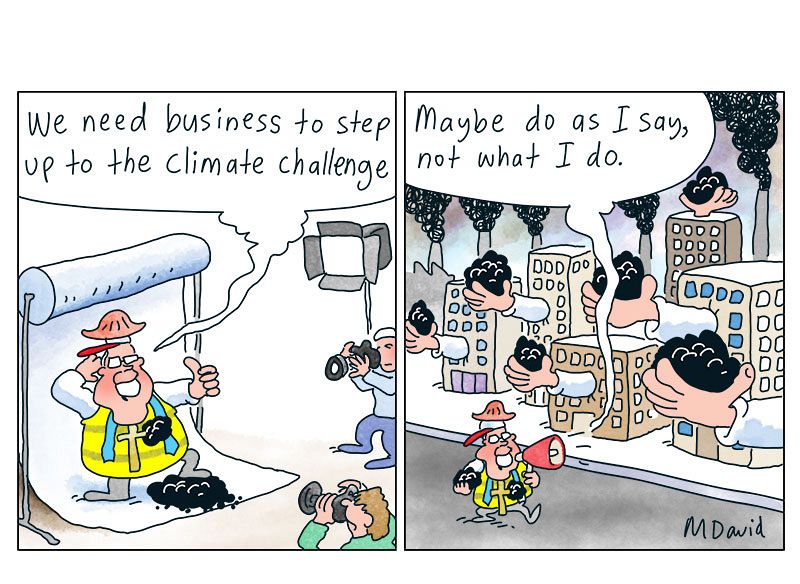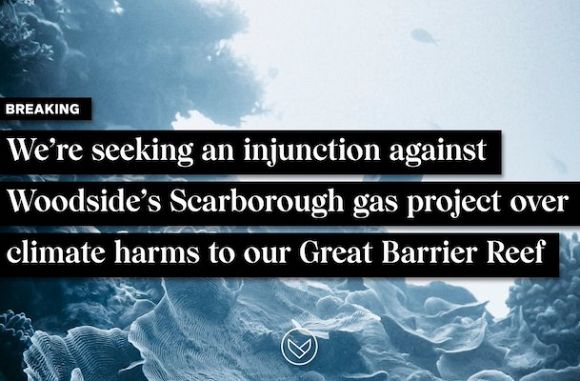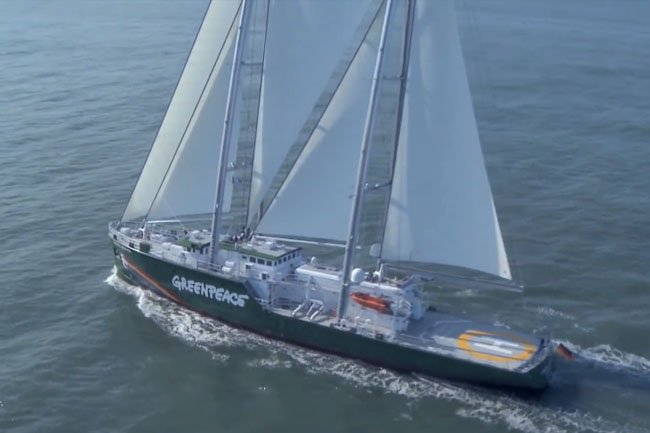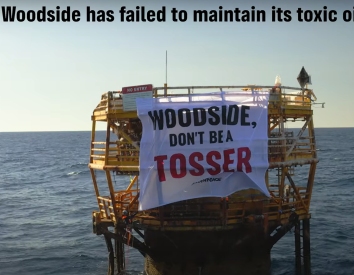Given the worsening climate crisis, there should be no place for fossil-fuel reputation washing by world-class polluter Woodside Energy in our public institutions — most certainly not our schools, writes David Ritter.
EARLIER THIS week, a dear mate and fellow West Australian by origin sent me the following text message:
'I just spoke to my niece in Perth and she was telling me about her Woodside-sponsored "science" class that involved identifying the benefits of gas via a fun science experiment with [chocolate] M&Ms and then they were given a Woodside bookmark with a list of “your future careers with Woodside”.'
My friend – and her niece – were both outraged. As the global climate strike movement has shown in abundance, many kids are keenly aware that climate change is already causing savage damage to people and nature all over the world — and they are rightly afraid that there will be global catastrophe within their lifetimes unless there is transformative change at emergency speed and scale.
In this context, allowing Woodside to perform cheap public relations stunts in school classrooms adds insult to existential injury.
Woodside Energy is Australia’s largest oil and gas mining and production company and – following the much-publicised merger with BHP Petroleum in June this year – is now one of the ten biggest in the world. According to Woodside's website, the merged entities are now 'building a better future’.
The brazenness of the empty signification could hardly be more surreal. Far from "building a better future", Woodside is now (up from second place, following the merger) Western Australia’s worst greenhouse gas emitter.
Woodside is also planning massive expansion in its mining and export of fossil gas in the form of various Burrup Hub projects.
Coming after the International Energy Agency (IEA) has already called for a total moratorium on new gas infrastructure to stave off the worst climate damage, Woodside is investing, planning, lobbying and strategising to lock in increasing greenhouse gas emissions until deep into this century.
Fortunately, many kids have excellent bullshit detectors. The students are right to think that the friendly stranger bringing chocolate into the classroom and profoundly telling them that gas is good, cannot be trusted.
Woodside company representatives turning up at the teacher’s table is not incidental but a clear indication of the corporation’s deliberate intention to attempt to manufacture social consent to enable it to continue polluting.
"Reputation washing" describes activities that are deliberately undertaken by a corporation to clean up the public image of the business by distracting from or hiding the ugly truth. In a longer piece published in the winter edition of Arena, I’ve gone into greater detail about Woodside’s various multilayered strategies for getting what it wants — especially in Western Australia. In particular, there’s no doubt that Woodside is engaged in industrial-scale reputation washing.
As writer and analyst Ketan Joshi noted in an excellent piece last year, Woodside has a long and none-too-subtle history of trying to influence young minds in schools as part of a wider pattern of sinister influence:
Fossil fuel companies – either Australian or with interests in Australia – are embedded deep into education, with incredible sway over content, framing and most importantly, full access to employment drives for one of the most harmful industries in the history of human civilisation — industries that specifically cause the most harm to the youngest people.
Woodside’s infiltration of schools appears to be wrapped within a professed commitment to science, technology, engineering and mathematics (STEM).
According to Woodside’s website:
'With a career in science, technology, engineering and mathematics (STEM), you could be predicting outcomes, solving environmental, industry, biomedical problems and exploring new technologies that may address some of today's challenges, while improving people's lives.'
And the massive polluter is right. You could be. But the truth is that, as leading analysts have found, Woodside’s current business strategy represents a bet against the world implementing the Paris Agreement and – absent any radical change in corporate direction – to have a career with the company would be to put your abilities in the service of furthering that cruel dystopian objective.
When controversy surrounding Woodside’s school STEM program was featured on ABC radio last year, it drew a strong response from former WA Chief Health Officer, Professor Charles Watson:
'They're trying to use our education system to soften up the public on these issues by telling them that they're basically nice people and that oil and gas aren't really anything to worry about. Whereas it [climate change] is the biggest public threat we've ever faced.'
Commercial interests should never be put before public education in our schools. But there is something especially perverse about allowing the agents of fossil fuel corporations to implicitly try to persuade our kids that the same oil and gas companies that are destroying their future are actually to be trusted.
My friend’s niece is right to be disgusted. Woodside being allowed to spruik its pollution in schools should not be permitted amid the global climate emergency.
We are in the midst of a climate crisis of which the largest driver is coal, oil and gas. In 2022, there should be no place for fossil-fuel reputation washing in our public institutions, sports or arts — and certainly not in our schools.
David Ritter is the chief executive officer of Greenpeace Australia Pacific. You can follow David on Twitter @David_Ritter.
Related Articles
- Don't be fooled by fossil fuel industry's 'green' word salads
- Coalition’s failure to tax gas windfall profits cost the nation billions
- Woodside's fossil fuel focus could push our climate over the edge
- As fuel prices surge, now is the time to go green
- Australia needs to ditch coal before it's too late
 This work is licensed under a Creative Commons Attribution-NonCommercial-NoDerivs 3.0 Australia License
This work is licensed under a Creative Commons Attribution-NonCommercial-NoDerivs 3.0 Australia License
Support independent journalism Subscribe to IA.














